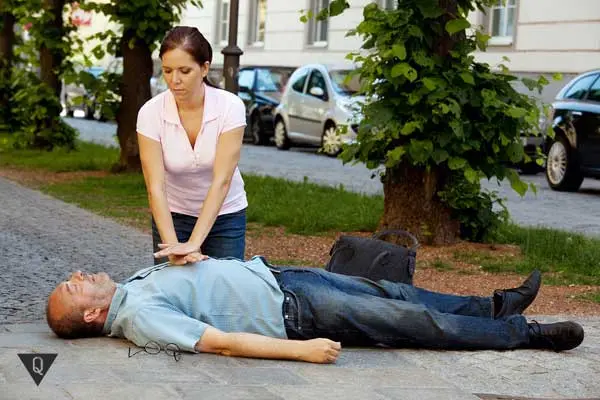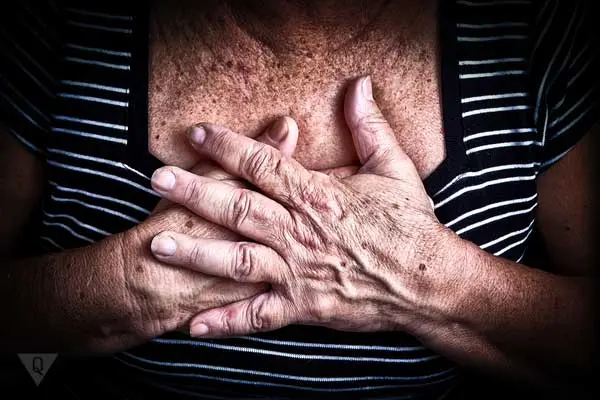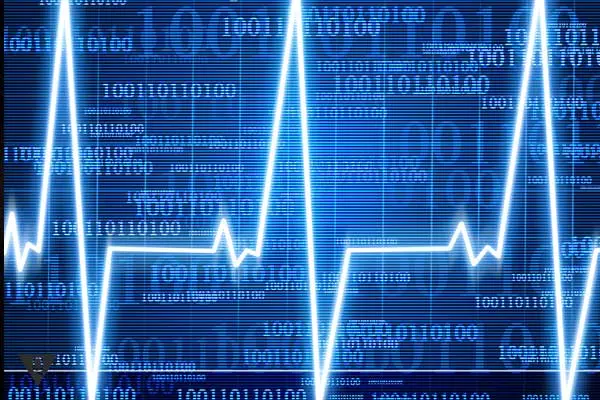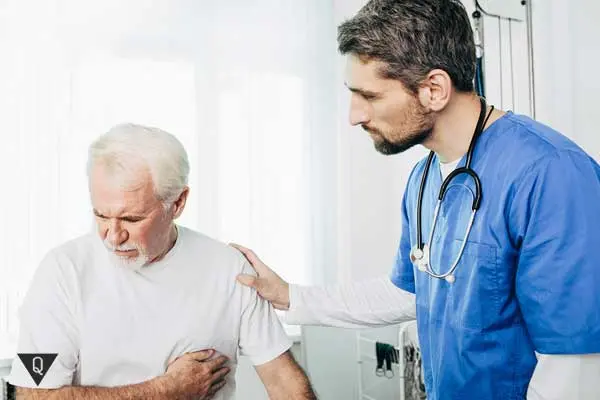Contents
Hello, dear readers of the site! Cardiophobia, or, as it is also called, cardioneurosis, is an irrational fear of dying from cardiac arrest, its “rupture” or “fading” for a while. And today we will try to figure out why it occurs and how to cure it.
What is it like?
Cardiophobia is one of the most common nosophobias (fear of getting sick and subsequently dying). It occurs both in people with certain cardiovascular diseases, and in completely healthy, full of strength and energy.
Feeling pain or discomfort in the region of the heart, a person is frightened. Thinking that he had a physiological disorder, because of which he needed urgent hospitalization, otherwise death would occur.
But in fact, heart palpitations or even spasms make themselves felt due to the emotional state. Which is completely unstable.
A cardiophobe constantly measures his pulse, avoids shocking news, listens to the slightest changes in his state of health. And he may not even go outside. In order not to accidentally experience any intense feelings from meeting and communicating with other people.
According to statistics, this type of disorder occurs more often in middle-aged men. It is precisely during this period that a crisis falls, which, perhaps, exciting and causing a lot of negative emotions, manifests itself in the form of somatics, that is, quite tangible physiological symptoms.
Cardiophobes at the slightest deviation in the work of the heart muscle turn to doctors for help. And they are not at all satisfied with the positive results of diagnostics.
If a specialist denied the existence of a mortal danger, then he is a bad specialist. And then you need to go to another, more insightful, qualified, who immediately recognizes a terrible disease.
Only such “journeys” among cardiologists do not bring success. Except when a person really has deviations.

Evidence
An attack of cardiophobia sometimes lasts several minutes. This was when it stung in the chest, there was a fear of cardiac arrest, but with the relief of well-being, disturbing thoughts also disappeared. Or maybe a few days, in severe cases — years.
At such a moment, the patient loses his critical thinking and becomes receptive, «obedient» and pliable.
He is fully concentrated on his feelings and is ready to share them without stopping. He carefully listens to the recommendations of doctors and agrees with everything. Of course, when they do not deny that he has a dangerous disease.
If you start the situation, a person can simply limit his physical activity by stopping getting out of bed so as not to provoke a heart attack.
And if he gets up, then he definitely won’t go out into the street all alone. After all, who then will help him if an attack occurs, and he does not have time to take a pill?
In general, as you understand, this phobia completely destroys the social life of a person. He quits to avoid unnecessary stress, breaks off relations for the same purpose.
She even stops doing housework, shifting responsibility for her own life and her well-being to relatives. What is the name of such a «disintegration» of a developed personality, and how to cope with it, you will learn from here.
In a panic attack, which usually occurs out of the blue, it usually throws you into a fever, sweating, it becomes difficult to breathe, and your hands are shaking.
Thoughts of imminent death flash in my head, pressure rises, the skin turns red. Sometimes tormented by nausea, dizziness, vomiting and even diarrhea, loss of consciousness.
Forms of manifestation
Pseudo-rheumatic
Patients complain of pain in the chest, joints, shortness of breath, weakness and palpitations. This form of manifestation of a phobia resembles, in its symptoms, rheumatic heart disease, that is, acquired.
With physical exertion, the discomfort increases, which causes panic and a desire to get to the specialists as soon as possible before it is too late. On examination, of course, no pathologies are found, but this in no way reassures the patient.

Pseudoinfarction
This form is for medically knowledgeable individuals, who are most often doctors, nurses and other employees of medical institutions.
A person who does not know what a myocardial infarction is, or rather, how it manifests itself, is unlikely to be diagnosed with it if once it slightly pricked in the chest.
Cardiophobes, realizing that every second counts, and that the faster medical care is provided, the more chances for survival the patient has, they will call an ambulance with or without it. Or torment your colleagues with constant complaints and requests for advice, examination and ECG.
Symptoms of completely different diseases that can easily be confused with a heart attack can lead to disturbing thoughts.
For example, the manifestation of intercostal neuralgia has caused quite a stir among individuals with this phobic disorder. And all because spasms of nerve endings can really be confused with heart pain.
Only now they do not go away after taking validol, which, in principle, is an excellent diagnostic method.
But cardiophobes simply will not believe that everything is fine with them and you just need to drink painkillers, anti-inflammatory drugs, limit physical activity and provide yourself with bed rest.
No, they will decide that they are in a hopeless position. And in the near future, if no measures are taken, they will simply leave this world.
neurotic
Usually, patients’ complaints are vague, in the sense that they do not fit into any diagnosis known to science. The patient himself does not know how to describe the symptom that he has experienced.
Let’s say he claims that it’s hard for him to breathe, that he has pain somewhere, but he doesn’t understand where exactly. What kind of pain is also not able to determine, that is, it pulls, pricks, presses or cuts, and so on.
Basically, it is this form of frustration that makes itself felt after suffering an emotional shock, for example, due to parting with a loved one, conflict, dismissal.
Causes

Hypochondria
This is a mental illness in which a person is firmly convinced that he is terminally ill. He goes to the doctors, endlessly complaining about health problems. Only now, when passing tests and undergoing diagnostics, he does not receive such a frightening, but desired diagnosis.
Because he’s actually healthy, physically. But mentally, not really, because, inventing all sorts of dangerous diseases for himself, he really believes in their presence. In addition, he also experiences characteristic symptoms.
He simply needs attention, and thus tries to get what was so lacking in childhood.
Parents, for example, could be very busy at work in order to feed themselves and gave affection, love to the child only at moments when he was very ill. As soon as he recovered, they again stepped aside and went about their important business.
So, cardiophobia often occurs due to the presence of hypochondria in the personality structure.
Personality traits
Impressive nature, having visited a relative in the cardiology department. Or, even worse, after lying in the hospital for a completely insignificant reason, they can be so frightened that they will find absolutely all the signs of the disease in themselves.
Roommates will only “throw” them information. Because usually people tend to exaggerate their ailments. To arouse the sympathy of the interlocutors, and respect for the tolerance of the injustice of fate.
Psychological trauma
News of the sudden death of a loved one, or even an unfamiliar person, is usually shocking, in the literal sense, «knocks the ground out from under your feet.»
They show how vulnerable we are, powerless in front of some phenomena and completely unprotected, no matter how much we want to believe in the justice of the world order.

Now, if this sudden death was due to a heart attack. Especially at a young, but by no means old age — this may well cause such a strong emotional reaction that will shake the stability of the psyche and provoke the development of a phobia.
Stress
This phobia also begins to develop due to a long stay of nervous tension. The personality loses its resources and becomes literally exhausted. Because the entire supply of energy goes to the fight against anxiety.
Therefore, it is not surprising that along with asthenia, chronic diseases also begin to appear in her. So to speak, weak points in the body make themselves felt.
Attention is concentrated mainly on one’s well-being, because it has changed dramatically.
Anxiety breeds uncertainty. Let’s say it hurts in the chest, and it’s not clear, you need to urgently contact the doctors, because suddenly it’s a heart attack, but no measures have been taken?
Or is fear out of nowhere and he will simply lose both his time and the specialists who could save someone’s life for this challenge? And if this is not an attack, but only its herald, then is it necessary to take medications to reduce the risk of a heart attack?
Previous illnesses
If a person has a history of heart problems, then, faced with a protracted expensive treatment, he will continue to fixate on his well-being. Since he definitely does not want to repeat the situation, and in some nuances he may not be able to master it.
Diagnosis and treatment
Diagnosis is carried out on the basis of the patient’s complaints, in connection with which he is assigned a number of medical studies. Among which are ultrasound of the heart, electrocardiography.
In some cases, bicycle ergometry, it allows you to find out how the heart reacts to stressful situations that are caused by physical exertion or special drugs injected into a vein.
Although patients take a lot of drugs, for example, validol, nitroglycerin, they do not feel any improvement in their health.
Trying to calm them down and reassure them that everything is fine is useless. If the cardiophobe listens, then only for a few minutes, after which he will again panic about the impending death.
Therefore, self-medication is by no means worth it, as you will simply lose time. And the trust of a loved one with this phobic disorder. Be sure to contact a psychotherapist, psychiatrist, in case of associated health difficulties.
For example, if insomnia arose on the background of experiences or there is no mood due to anxiety, which cannot be eliminated in any way.
In this case, the psychiatrist will prescribe antidepressants, sedatives, sleeping pills, and so on, depending on the situation.
Sometimes outpatient treatment is required, but not in the cardiology department, but in the neurological department.
Recommendations
In order not to think about how to get rid of any kind of phobias, do prevention. That is, take care not only about physical health, but also mental.
First of all, learn to get rid of unnecessary stress and anxiety. Daily stress destroys our lives. But it is quite possible to reduce their negative impact, or even get rid of it.
Practice yoga, meditation. In moments when you feel that you are at the limit, use breathing techniques, they will help you relax and calm down.
Go in for sports, if prohibited by doctors, then at least therapeutic exercises. Avoid toxic people and try to listen to your own desires.
There is no better healer than joy and awareness of how interesting and beautiful life is. Believe me, outside of hospitals, the world is much more interesting, even if sometimes more dangerous, but it will not leave anyone indifferent.
Travel, connect with people who inspire you, and do what makes you happy. Let it be a knitting circle or car repair, which is not at all connected with the main profession, but it attracts so much.
Completion
Panic fear of dying from a heart attack sometimes provokes the development of other types of phobias. For example, a person can also acquire hypnophobia (you can find out what it is and how to get rid of it by clicking on this link).
Take care of yourself, be healthy, and of course, be happy!
The material was prepared by a psychologist, Gestalt therapist, Zhuravina Alina









